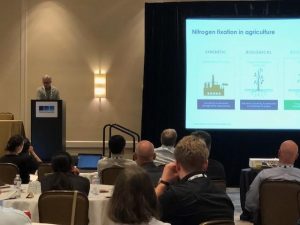 Advances in agricultural productivity in the past century have supported farmers to feed a growing population, yet some of these advances have an environmental impact. For example, today’s food systems are responsible for 20-30% of global greenhouse gas emissions, and runoff of agricultural nutrients into waterways contribute to hypoxic zones downstream threatening marine life and fisheries, and contribute to biodiversity loss.
Advances in agricultural productivity in the past century have supported farmers to feed a growing population, yet some of these advances have an environmental impact. For example, today’s food systems are responsible for 20-30% of global greenhouse gas emissions, and runoff of agricultural nutrients into waterways contribute to hypoxic zones downstream threatening marine life and fisheries, and contribute to biodiversity loss.
As a scientist dedicated to finding new and better ways to produce food, I am convinced this next century of discoveries will profoundly transform agricultural practices and improve productivity – not only to feed our planet, but also make it more sustainable. I had the pleasure of presenting at the recent 2nd Annual CRISPR & NBT AgBio Congress. Along with other industry and academic researchers as well as leaders from the U.S. Department of Agriculture, the FDA, American Seed Trade Association and DARPA’s Biological Technologies Office, we shared technical advances and views about precision genome editing and novel breeding technologies in agriculture, and how these technologies will help increase crop yields and develop environmentally sustainable products.
We heard valuable insights on how the latest precision genome editing technologies could be used to advance the discovery and commercialization of traits to expedite the next generation of ag products. My presentation, “Computationally-Guided Microbial Remodeling: Flipping the Switch for Better Nutrient Availability and Uptake by Crops” described how innovations at Pivot Bio are being used to develop microbes that fix atmospheric nitrogen for use by major cereal crops.
I shared Pivo Bio’s commitment to replace all synthetic nitrogen fertilizer. Without fertilizer for worldwide food production, we would produce half as much food. While this dependence on synthetic fertilizer has enabled greater food supply, it has created unintended environmental consequences. Today, annual global nitrogen production surpasses 118 million metric tons, resulting in more than $150 billion in increased greenhouse gas emissions and damages to our terrestrial and aquatic ecosystems.
You could say up until now, the use of fertilizer has been a bit of a “Goldilocks dilemma.” In some cases, fields are under fertilized limiting their yield potential, while nearly 40 percent of farmland is over fertilized, resulting in excess runoff of chemicals into our water, soil and air. The approach that Pivot Bio is innovating is one that’s just right. It is crop nutrition that provides the plant with the nutrient supply it needs — ensuring the right amount of nitrogen is available to the plants throughout the growing season, without the harmful consequences of today’s synthetic nitrogen fertilizer.
Pivot Bio’s nitrogen-producing microbes adhere to the corn plants’ roots and are not susceptible to runoff or leaching, keeping our waterways cleaner. Whether it’s cool, hot, wet or dry, they respond and nourish the plants based on their need every minute, every day. This adaptability is crucial to farmers as the elements and crop stresses can vary dramatically across one single acre and within a few days.

It’s interesting to think about how the fertilizer industry may change over the next decade thanks to the introduction of microbial products, precisely nourishing our crops.
Pivot Bio’s first generation product is being tested across the Corn Belt this summer as part of our Intent to Pivot trials. We anticipate commercial product introduction in 2019, and this milestone is a critical step toward providing new tools to farmers that help them nourish their crops while keeping our air and waterways clean. The work we’re doing to reduce our reliance on fertilizer was echoed in other talks throughout the event. Some interesting questions were also raised by the audience members in regard to future applications of the microbes on other crops and environmental stress conditions – both topics for me to consider for my next post.
To view my full presentation from the CRISPR&NBT Agbio Congress, click here.
LEARN ABOUT THE LATEST NEWS AND BREAKTHROUGHS FROM PIVOT BIO.
Pivot Bio is a leader in the field of precision microbial adaptation. Our unique process is designed to realize the full potential of microbes at the genetic level, allowing farmers to change the way they provide nutrition to crops, reduce usage of fertilizers and provide a sustainable approach to feeding our world’s growing population. For more information, contact us at: 1-877-495-3777 or info@pivotbio.com